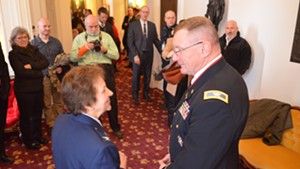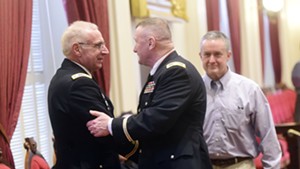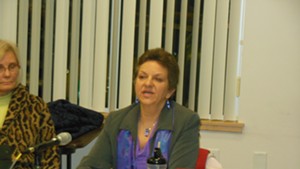
- Kevin McCallum
- A conference committee of the Vermont legislature meets to discuss the adjutant general selection process.
There are plenty of differences between two versions of a bill that would change how Vermont picks the leader of its National Guard, but only one that really matters: who gets the final say.
The House wants the legislature to retain its power to elect the adjutant general every two years, a prerogative that stretches back to the state’s storied militia era. The Senate prefers handing over that power to the governor, reasoning that it just makes sense to let the state's top elected official appoint its top military officer.
Members of a six-member conference committee met for the first time Thursday to come up with a compromise over the bill,
H.530, that would pass muster with the House, the Senate and, ultimately, the governor. It quickly became clear that there was only one real battle line to draw.
“The $1 million question here is, does the governor appoint, or does the General Assembly continue to elect?” legislative attorney Damien Leonard told the committee.
The short meeting — by Statehouse standards, anyway — revealed no signs of how the two sides might bridge the gulf between their positions, but it did clarify how they arrived at their divergent views.
Senators stressed the dysfunction of the current process, suggesting that asking 150 representatives and 30 senators to vet and vote on multiple candidates for the post was an antiquated, awkward and inefficient process.
“If you asked 180 of us who were the four candidates who ran this year, I’m not sure many people would remember all four and be able to tell you much about them,” Sen. Brian Collamore (R-Rutland) said.
Rep. Tom Stevens (D-Waterbury) said he agreed that the vetting process needed to be more extensive and noted that both bills called for a nine-member nominating panel empowered to interview candidates in greater depth. But Stevens pointed out that the House General, Housing and Military Affairs Committee, which he chairs, felt strongly that the ultimate selection decision should still rest with the legislature.
“By having our representatives and senators vote for this, it keeps the voice of the people, as a theory, that our constituents can tell us what they think through us,” Stevens said.
That election process, Collamore noted, often involves forcing military officers to campaign for a position that is supposed to be apolitical, which he said was “uncomfortable for them.”
“You’re putting them in a political process that’s 180 degrees away from the military process that they live by,” Collamore said.
He also noted that there is little time for legislators to figure out the best candidate.
“I think the governor would have more time, more staff and more ability to really pick who it should be,” Collamore said.
According to Sen. Jeanette White (D-Windham), the Senate considered the possibility that having a governor pick the adjutant general could lead to cronyism. She then moved her hands up and down like a scale and, with a smile, said “cronyism, popularity contest.”
Stevens noted that both bills include qualifications for the position, which would help ensure that the best candidates were ultimately selected. He noted that the tradition and history in the process make the conversation a delicate one.
“We have a unique system, which sometimes you’re proud of and sometimes you just have to ask why?” he said.

















Comments (4)
Showing 1-4 of 4
Comments are closed.
From 2014-2020, Seven Days allowed readers to comment on all stories posted on our website. While we've appreciated the suggestions and insights, right now Seven Days is prioritizing our core mission — producing high-quality, responsible local journalism — over moderating online debates between readers.
To criticize, correct or praise our reporting, please send us a letter to the editor or send us a tip. We’ll check it out and report the results.
Online comments may return when we have better tech tools for managing them. Thanks for reading.